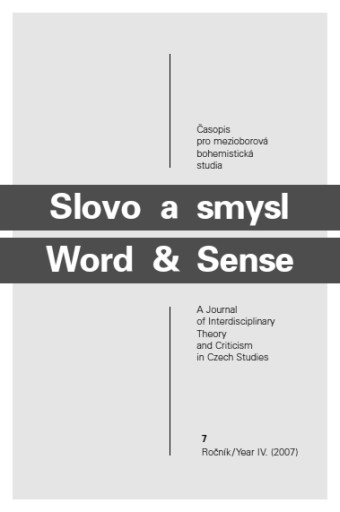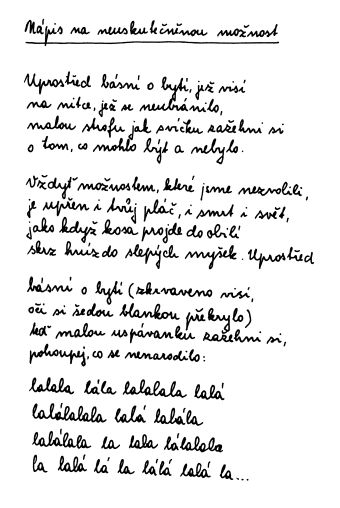Editorial
The topic for this issue of Word and Sense came out of a discussion among the editorial board members in September of last year. The suggestion of our Italian colleague, Annalisa Cosentino, to devote issue 7 to poetry gradually expanded to include the place of poetry in contemporary literary discourse and the varied methodological approaches to how poetry is interpreted. Last but not least, it came to include interpreting poetry as a means to a uniquely profound reflection of life – in other words, it expanded to take in the way aesthetic and ethical quality are bound together in such rare fashion in the act of reading and explicating poetry. Studies and Sketches turns to various matters arising from this binding as constituted. The study by New York Bohemist Kirsten Lodge, which opens this issue, and the article following, by Ondřej Klimeš, a student of Czech at Charles University, Prague, approach – each in a different way – general questions about the nature of the poetic oeuvre. It could be said that through analysing works of poetry, both texts refer to the principles of poetic vision, to the peculiarities of its techniques, and especially to the awareness that contemporaneous acceptance of poetic expression cannot be taken for granted. Kirsten Lodge returns once again to Mácha’s work, to questions of the mythopoetics of May, a work that – as is well known – fell completely flat with the critics of its time and the broader cultural audience, with the exception of a small circle of the poet’s acquaintances. In its own way, May thus became a peripheral, almost an underground entity. An analogy to this study can in one sense be found in Ondřej Klimeš’s approach to the poetic works of 1970s Czech underground artist Josef Vondruška, in which Klimeš discerns the beginnings of Czech literary punk. Of course this is not meant to compare Mácha and Vondruška, but rather to highlight the rationale in searching for primary poetic values, and thus life values, in the realms of the periphery, which spurn official artistic centres ostentatiously, developing emblems for their group or movement as well as specific artistic methods.
In his contribution, Sienna professor Francesco Stella returns to matters of contemporary social reflection, informing us about the Italian journal of comparative poetics Semicerchio (Semicircle), which creates an inclusive space for research and the clash of various kinds of poetics in Italy. However, at the same time Stella addresses the fundamental question of the canonization of poetic works and their relationship to changing societal bonds. His contribution is thus particularly relevant to contemporary Czech discussions about the literary canon, which run through the scholarly community, starting with the practical needs of primary and secondary education and continuing into the conceptualization of how literary history should be written.
Studies by Pavla Jonssonová and Eva Kalivodová point to the possibilities of a gender-based approach to reading poetry, to the inspirational intertwining of various scholarly and socially meaningful zones and to the possibilities offered by a sociological perspective. The nature of so-called “woman’s sleep” is treated in Marie Mravcová’s study on the poetics of Virginia Woolf; Mravcová’s work is especially inspirational in the way it relates her awareness of the uniqueness of the poet’s creative methods to her attempt to generalize the fundamental structural principles of the artistic work on the basis of analyzing poetic and narrative devices.
A triptych of studies by Lucie Kostrbová, Petr Komenda and Michal Bauer and represent the varied possibilities of a literary-historical approach to the phenomenon of poetry. Lucie Kostrbová analyzes key moments in the formation of a poetic and personal relationship between two defining personalities of the Czech fin de siècle – Jaroslav Vrchlický and J. S. Machar. Petr Komenda conducts a detailed and highly revealing analysis of the specific poetic methods of František Halas in the second half of the 1930s, while Michal Bauer examines the strategies of the plenary meeting of the Czechoslovak Writers Union on socialist poetry, which took place on 22 January 1950 in Prague’s Civic House and featured the famous speech by Ladislav Štoll, published later that year under the title Třicet let bojů za českou socialistickou poezii (Thirty Years of Battles for Czech Socialist Poetry). Bauer demonstrates the perversity of the totalitarian regime’s practices, which used almost every means possible in the pursuit of their goals. At the same time, his study makes very clear the hidden power of poetry, which survives temporary abuse (as distinct from poets, unfortunately) and can even be strengthened by it.
The closing article by Annalisa Cosentino gives a comprehensive discussion of the literary critic A. M. Ripellino – one of the greatest experts on Czech poetry abroad and a tireless promoter of it. Annalisa Cosentino mentions both Ripellino’s historical studies and his specific interpretive approaches to the explication of key Czech authors. In comparison with Bauer’s study, however, what shines through is not just the significance of Ripellino’s scholarly deeds, but also their general cultural meaning, for Ripellino preserved an awareness of the entirety of Czech literature at a time when that integrity was being denied and misinterpreted by communist ideologues in its home environment.
The section Retrospectives commemorates the recently deceased professor and poet Miroslav Červenka, who was one of the key personalities in Czech literary studies of the second half of the twentieth century, with a memorial article by Polish literary scholar Lucylla Pszczołowska and versification studies from among Červenka’s effects.
A Question for… returns to the matter of lyric poetry and lyricism. We asked woman poets who are at the same time literary scholars and art historians about the age-old question of the meaning of lyric poetry and its interpretation in contemporary society. The question is infinitely impertinent in its generality, but at the same time it is absolutely fundamental in the need for us to raise it over and over… We thank Sylva Fischerová, Alena Nádvorníková and Sylvie Richterová for their very inspiring and provocative answers, but most of all for their bravery in venturing onto this territory abandoned so long ago, it seems, by even Sisyphus himself.
Critical perspectives and glosses appear in review articles by Martin Pokorný, on Petr Koťátka’s book Interpretace a subjektivita (Interpretation and Subjectivity); by Robert Ibrahim on Miroslav Červenka’s crowning work on versification, Kapitoly o českém verši (Chapters on Czech Verse); by Patric Flack on Hans-Ulrich Gumbrech’s The Production of Presence: What Meaning Cannot Convey; and by Gertraude Zandová on a new edition of the well-known volume Život je všude. Almanach z roku 1956 (Life is Everywhere: An Almanac from 1956), which was undertaken by Josef Hiršal and Jiří Kolář.
Viola Parente-Čapková reports on the activities of the Italian cultural association Hebenon, which awarded Karel Šiktanc its NOBELito international prize for literature and philosophy.
At the end of this section we bring you an edited transcript from the scholarly colloquium Speech of the North, which took place during an offsite meeting of the authorial team for the project Dějiny novější české literatury v nadnárodních kontextech (The History of Modern Czech Literature in Supranational Contexts).
The section Translations_Překlady contains two texts by the notable Russian cultural historian Sergei Averintsev, in a translation by Ladislav and Miluše Zadražil. In the section Překlady_Translations, we present a selection of Jiřina Hauková’s poetic work in Czech with parallel English translations by Alexandra Büchler, plus a commentary by Libuše Heczková.
Libuše Heczková, Josef Vojvodík and Jan Wiendl (translated by Neil Bermel)


